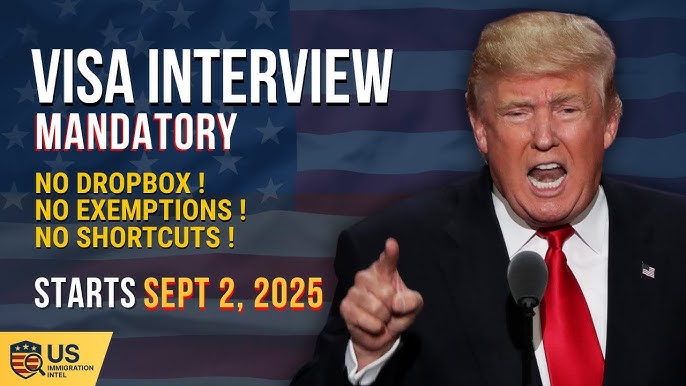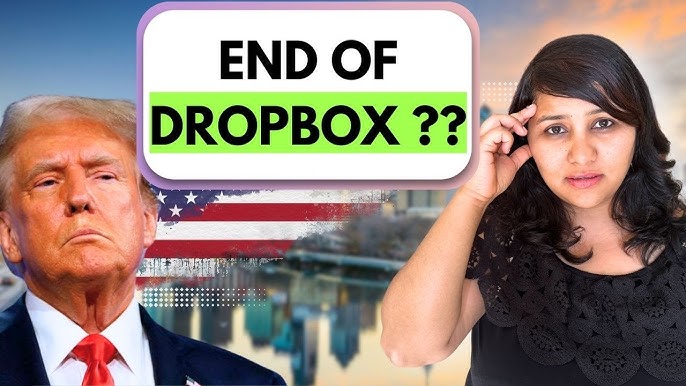US Ends ‘Dropbox’ Visa Renewals from September 2 marks a significant turning point in U.S. visa policy — a decisive rollback of the streamlined "Dropbox" or Interview Waiver Program that many applicants have come to rely on. As of Beginning September 2, 2025, all candidates, including children under 14 and seniors over 79, will have to appear in person for an interview with a consular officer. The amendment was proposed by the Trump administration to strengthen security and immigration screening. This policy change reverses the more flexible, expedited waiver system that had become familiar during the pandemic and early recovery years.
This article delves deeply into the background, implementation, implications, and undeniable fallout of this policy shift — supported by authoritative sources, legal context, and practical considerations for applicants, employers, and institutions worldwide.
Background: The Rise and Role of the “Dropbox” Interview Waiver Program
The Interview Waiver Program (IWP)—colloquially known as "Dropbox"—was instituted by the U.S. Department of State to permit certain nonimmigrant visa applicants to submit their documentation at designated centers, bypassing the need for an in-person consular interview. This flexibility, enshrined under Foreign Affairs Manual (9 FAM) section 403.5, offered waivers based on factors like prior visa history, visa category, or age (under 14 or over 79).
During the COVID-19 pandemic and its aftermath, this program served as a crucial mechanism to reduce consular backlogs, protect applicants and officers, and expedite processing for low-risk individuals. Over time, eligibility criteria had narrowed, but within this framework, it remained a vital lifeline for many.
The Rollback Announcement and Its Terms
On July 25, 2025, the Department of State issued a formal update announcing a sweeping reduction in the scope of interview waiver eligibility. Effective September 2, 2025, the majority of nonimmigrant visa applicants will be required to attend an in-person interview at a U.S. embassy or consulate, regardless of age or prior visa history—unless they fall into very specific categories.
The change explicitly states that “Beginning September 2, 2025, all candidates, including children under 14 and seniors over 79, will have to appear in person for an interview with a consular officer.”
Exceptions are extremely limited:
-
Diplomatic or official visas, including categories A-1, A-2, C-3 (excluding attendants/servants), G-1 through G-4, NATO-1 to NATO-6, and TECRO E-1 remain eligible for waivers.
-
B-1/B-2 or Border Crossing Card/Foil renewal may still qualify only if:
-
The prior visa of full validity expired within the past 12 months.
-
The applicant was at least 18 when the prior visa was issued.
-
They apply in their country of nationality or residence.
-
They have never been refused a visa (unless such refusal was overcome or waived).
-
They have no apparent or potential ineligibility.
-
Even then, consular officers retain discretion to require an interview.
“Dropbox” Program Ends: Why Now?
This policy rollback comes amid growing political and security concerns. As noted by NDTV, “The amendment was proposed by the Trump administration to strengthen security and immigration screening.”.
Multiple legal and policy layers are at play:
-
The Trump administration historically placed greater emphasis on in-person screening and rigorous vetting—this change reflects that philosophy restored.
-
Narrowing interview waivers aligns with renewed focus on national security, fraud prevention, and immigration control — emphasizing physical presence and direct scrutiny.
Who Is Affected?
A. Most Nonimmigrant Visa Categories
Applicants in the following categories will be directly impacted and will now require interviews:
-
Work-related visas: H-1B, H-4, L-1, L-2, O-1 (extraordinary ability workers).
-
Student and exchange visas: F-1, F-2, M-1, J-1.
-
Other visa categories previously eligible for Dropbox will also be affected.
B. Special Age Groups — No Longer Exempt
Applicants under 14 and over 79, who had been broadly exempt from interviews, will now generally be required to appear in person, unless they fall into one of the narrow exceptions above.
C. Those Who Still Qualify for Waivers
Reiterating exceptions:
-
Diplomatic/official visa holders: A-1, A-2, C-3 (not attendants/servants), G-1 to G-4, NATO-1–6, TECRO E-1.
-
B-1/B-2 renewals within 12 months of expiry, with strict criteria, subject to interview discretion.
Practical Impacts: Visa Applicants, Employers, Institutions
The implications of US Ends ‘Dropbox’ Visa Renewals from September 2 are sweeping:
A. For Applicants
-
Longer wait times: High demand for interviews will exacerbate appointment backlogs, especially in high-volume countries like India.
-
Increased travel costs and logistical challenges: Applicants must now travel to consulates, arrange documentation, and manage potentially multiple reschedules.
-
Disruption of plans: Students may face delays in starting academic programs; professionals (e.g., H-1B visa holders) could face onboarding delays; families may undergo scheduling challenges.
-
Age groups impacted: Children and seniors previously exempt must now navigate the full interview process.
B. For Employers, Universities, Sponsors
-
Operational disruption: Companies employing international talent must factor in processing delays — this threatens project timelines, onboarding efficiency, and staffing logistics.
-
Advising applicants: Entities must prepare applicants to gather documents, practice interviews, and schedule far in advance. Education institutions should prepare to assist international students in planning around visa timelines.
C. General Trend and Policy Tone
-
A clear swing from efficiency-enhancing pandemic-era policies to a more conservative, security-conscious posture in immigration administration.
-
Reinforces traditional vetting via face-to-face screening—reflecting long-standing policy preferences for in-person interviews in U.S. consular practice.
Recommendations: What You Should Do Now
A. If You’re Eligible for a Dropbox Renewal — Act Quickly
-
Submit your renewal before September 2, 2025, to secure a potential waiver appointment. Once the deadline passes, dropbox eligibility will vanish for most categories.
B. If You Need to Schedule an Interview
-
Prepare early: Begin your DS-160, pay MRV fees, gather supporting documents well in advance.
-
Check consulate websites frequently for updates and appointment openings.
-
Be ready for delays: Allocate buffer time in your academic or employment start dates.
-
Practice your interview: Especially for H-1B applicants, focus on explaining your role clarity (“what” and “why”), dual-intent aspects, and professional qualifications.
-
Explore expedite requests: Possible in emergencies, but approval is discretionary and often limited.
-
Avoid third-country applications unless absolutely necessary—this may trigger "administrative processing" and longer wait times.
C. For Employers & Institutions
-
Reassess timelines: Incorporate visa processing buffers into schedules.
-
Support applicants: Offer guidance on visa interview prep, documentation, and scheduling.
-
Stay updated: Monitor U.S. embassy/consulate advisories and policy changes.
Legal & Policy Context: Beyond the Headlines
This shift reverses pandemic-era flexibility and reflects a broader recalibration:
-
The Foreign Affairs Manual (9 FAM) outlines the statutory basis and exceptions for interview waivers — particularly relevant is section 403.5.
-
Executive decisions during Trump's term—including 2017's review of IWP—laid groundwork for tightening visa screening. The current amendment can be understood as a renewed alignment with that approach.
-
The policy underscores how immigration regulation often balances efficiency and control — here tilting decidedly toward the latter.
Looking Ahead: What to Expect
-
Sustained demand: U.S. embassies and consulates will face prolonged surge in interview appointments.
-
Backlogs into 2026: Especially heavy for countries with high visa volumes.
-
Potential further tweaks: Visa integrity measures like application fees (e.g., reported $250 fee) could be introduced.
-
Policy monitoring: Future changes may refine exceptions or streamline interview processes again, depending on operational capacity and administration priorities.
Summary Table: Key Elements at a Glance
| Aspect |
Details |
| Policy Title |
US Ends ‘Dropbox’ Visa Renewals from September 2 |
| Effective Date |
Beginning September 2, 2025, in-person interviews required for nearly all applicants |
| Proposal Source |
Introduced in Trump-era policy shifts; formalized July 25, 2025 |
| Who Is Affected |
H, L, F, M, J, O-1 applicants; minors under 14 and seniors over 79 |
| Remaining Waivers |
Diplomatic/official categories; narrow B-1/B-2 renewals with conditions |
| Major Impacts |
Longer wait times, logistical delays, increased scrutiny, operational disruptions |
| Recommendations |
Act early for Dropbox renewals; prepare thoroughly; adjust timelines |
| Underlying Policy Shift |
From convenience toward security-focused vetting |
| Future Outlook |
Interviews surge, backlogs persist, with possible policy refinements ahead |
Conclusion:
In summary, the announcement that US Ends ‘Dropbox’ Visa Renewals from September 2 signals a dramatic reshaping of U.S. nonimmigrant visa processing. The elimination of widespread interview waivers—Beginning September 2, 2025, all candidates, including children under 14 and seniors over 79, will have to appear in person for an interview with a consular officer. The amendment was proposed by the Trump administration to strengthen security and immigration screening—stands as both a pivot in immigration policy and a broader marker in post-pandemic normalization.
Applicants, employers, universities, and institutions must now adapt to a return to in-person vetting, with all its attendant delays and complexities. Strategic preparation, early scheduling, and clear communication have never been more important.






